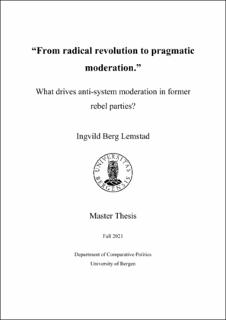| dc.description.abstract | A growing literature researches how former rebel parties (FRPs), parties with a past as insurgency groups, adjust to being part of formal political systems. Yet, little has been written about FRPs as a cohesive category or population, nor the the cross-case causal mechanisms driving FRP adjustment. This thesis tries to remedy these knowledge gaps.
The thesis constructs a new concept of “anti-system moderation” to measure how and whether FRPs change the anti-system elements of ideology, behaviour and violence to fit with the norms of the formal political system. The concept basis its logic on the concept of anti-democratic moderation used to study radical Islamic parties. The concept of anti-system moderation forms part of a broader analytical framework hypothesising causal mechanisms and causal relationships between independent variables and changes in rebels anti-system characteristic. The thesis tests the framework in a medium-N analysis of 10 cases, inspired by systemic review, in which 13 previously published studies of FRPs are used as the data for analysis. These 13 studies are coded to fit with the framework. The cross-case patterns among the 10 FRPs analysed form the basis for conclusions.
The analysis finds that anti-system moderation and its operationalization has empirical validity in the 10 cases analysed. It also finds that participation in formal political systems cause former rebel parties to adjust to system norms. The results suggest that anti-system moderation is driven by a causal cost/benefit mechanism, and that FRPs will moderate if the system provides incentives for it to do so. The thesis concludes that incentives for moderation have a stronger effect when dominant internal party actors desire moderation. The analysis identifies four main variables determining moderation outcomes; (1) whether the dominant party faction supports moderation, (2) electoral results, (3) whether FRPs’ core supporters endorse or resist moderation, and (4) whether structural conditions created by wartime provide incentives for FRPs to moderate.
The thesis also contains a broad literature review of past literature on FRPs, defines its various camps and paradigm shifts in research, and comments on the conceptualisations of politics and normative values underpinning past research on FRPs. It also argues that these underpinnings should be changed, to better reflect the empirical realities of FRPs contexts as non-democratic political spaces existing at the intersection between war and peace. | |
